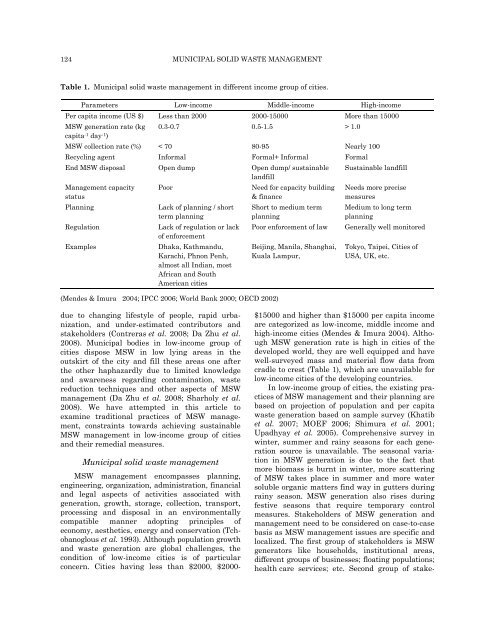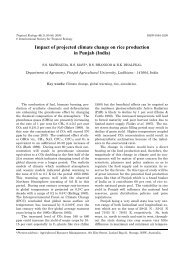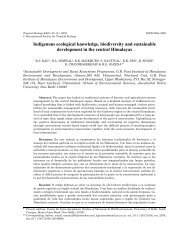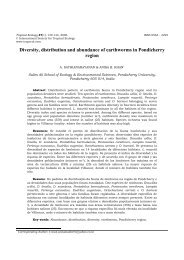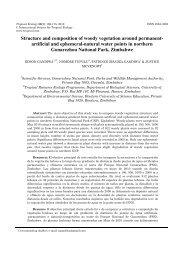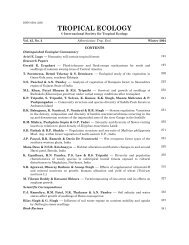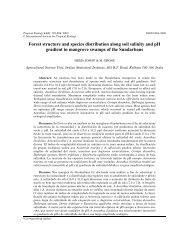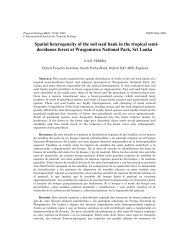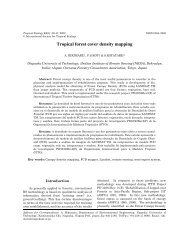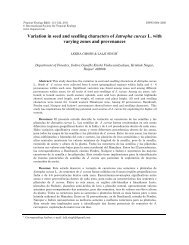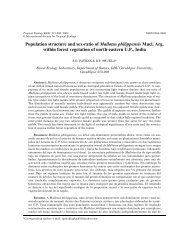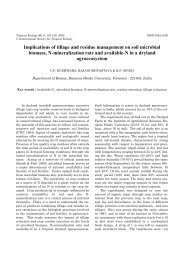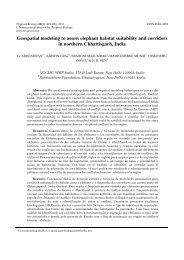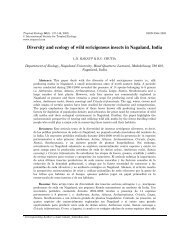Sustainable municipal solid waste management in ... - ResearchGate
Sustainable municipal solid waste management in ... - ResearchGate
Sustainable municipal solid waste management in ... - ResearchGate
Create successful ePaper yourself
Turn your PDF publications into a flip-book with our unique Google optimized e-Paper software.
124 MUNICIPAL SOLID WASTE MANAGEMENT<br />
Table 1. Municipal <strong>solid</strong> <strong>waste</strong> <strong>management</strong> <strong>in</strong> different <strong>in</strong>come group of cities.<br />
Parameters Low-<strong>in</strong>come Middle-<strong>in</strong>come High-<strong>in</strong>come<br />
Per capita <strong>in</strong>come (US $) Less than 2000 2000-15000 More than 15000<br />
MSW generation rate (kg 0.3-0.7 0.5-1.5 > 1.0<br />
capita -1 day -1 )<br />
MSW collection rate (%) < 70 80-95 Nearly 100<br />
Recycl<strong>in</strong>g agent Informal Formal+ Informal Formal<br />
End MSW disposal Open dump Open dump/ susta<strong>in</strong>able<br />
landfill<br />
<strong>Susta<strong>in</strong>able</strong> landfill<br />
Management capacity<br />
status<br />
Plann<strong>in</strong>g<br />
Regulation<br />
Examples<br />
Poor<br />
Lack of plann<strong>in</strong>g / short<br />
term plann<strong>in</strong>g<br />
Lack of regulation or lack<br />
of enforcement<br />
Dhaka, Kathmandu,<br />
Karachi, Phnon Penh,<br />
almost all Indian, most<br />
African and South<br />
American cities<br />
(Mendes & Imura 2004; IPCC 2006; World Bank 2000; OECD 2002)<br />
Need for capacity build<strong>in</strong>g<br />
& f<strong>in</strong>ance<br />
Short to medium term<br />
plann<strong>in</strong>g<br />
Poor enforcement of law<br />
Beij<strong>in</strong>g, Manila, Shanghai,<br />
Kuala Lampur,<br />
Needs more precise<br />
measures<br />
Medium to long term<br />
plann<strong>in</strong>g<br />
Generally well monitored<br />
Tokyo, Taipei, Cities of<br />
USA, UK, etc.<br />
due to chang<strong>in</strong>g lifestyle of people, rapid urbanization,<br />
and under-estimated contributors and<br />
stakeholders (Contreras et al. 2008; Da Zhu et al.<br />
2008). Municipal bodies <strong>in</strong> low-<strong>in</strong>come group of<br />
cities dispose MSW <strong>in</strong> low ly<strong>in</strong>g areas <strong>in</strong> the<br />
outskirt of the city and fill these areas one after<br />
the other haphazardly due to limited knowledge<br />
and awareness regard<strong>in</strong>g contam<strong>in</strong>ation, <strong>waste</strong><br />
reduction techniques and other aspects of MSW<br />
<strong>management</strong> (Da Zhu et al. 2008; Sharholy et al.<br />
2008). We have attempted <strong>in</strong> this article to<br />
exam<strong>in</strong>e traditional practices of MSW <strong>management</strong>,<br />
constra<strong>in</strong>ts towards achiev<strong>in</strong>g susta<strong>in</strong>able<br />
MSW <strong>management</strong> <strong>in</strong> low-<strong>in</strong>come group of cities<br />
and their remedial measures.<br />
Municipal <strong>solid</strong> <strong>waste</strong> <strong>management</strong><br />
MSW <strong>management</strong> encompasses plann<strong>in</strong>g,<br />
eng<strong>in</strong>eer<strong>in</strong>g, organization, adm<strong>in</strong>istration, f<strong>in</strong>ancial<br />
and legal aspects of activities associated with<br />
generation, growth, storage, collection, transport,<br />
process<strong>in</strong>g and disposal <strong>in</strong> an environmentally<br />
compatible manner adopt<strong>in</strong>g pr<strong>in</strong>ciples of<br />
economy, aesthetics, energy and conservation (Tchobanoglous<br />
et al. 1993). Although population growth<br />
and <strong>waste</strong> generation are global challenges, the<br />
condition of low-<strong>in</strong>come cities is of particular<br />
concern. Cities hav<strong>in</strong>g less than $2000, $2000-<br />
$15000 and higher than $15000 per capita <strong>in</strong>come<br />
are categorized as low-<strong>in</strong>come, middle <strong>in</strong>come and<br />
high-<strong>in</strong>come cities (Mendes & Imura 2004). Although<br />
MSW generation rate is high <strong>in</strong> cities of the<br />
developed world, they are well equipped and have<br />
well-surveyed mass and material flow data from<br />
cradle to crest (Table 1), which are unavailable for<br />
low-<strong>in</strong>come cities of the develop<strong>in</strong>g countries.<br />
In low-<strong>in</strong>come group of cities, the exist<strong>in</strong>g practices<br />
of MSW <strong>management</strong> and their plann<strong>in</strong>g are<br />
based on projection of population and per capita<br />
<strong>waste</strong> generation based on sample survey (Khatib<br />
et al. 2007; MOEF 2006; Shimura et al. 2001;<br />
Upadhyay et al. 2005). Comprehensive survey <strong>in</strong><br />
w<strong>in</strong>ter, summer and ra<strong>in</strong>y seasons for each generation<br />
source is unavailable. The seasonal variation<br />
<strong>in</strong> MSW generation is due to the fact that<br />
more biomass is burnt <strong>in</strong> w<strong>in</strong>ter, more scatter<strong>in</strong>g<br />
of MSW takes place <strong>in</strong> summer and more water<br />
soluble organic matters f<strong>in</strong>d way <strong>in</strong> gutters dur<strong>in</strong>g<br />
ra<strong>in</strong>y season. MSW generation also rises dur<strong>in</strong>g<br />
festive seasons that require temporary control<br />
measures. Stakeholders of MSW generation and<br />
<strong>management</strong> need to be considered on case-to-case<br />
basis as MSW <strong>management</strong> issues are specific and<br />
localized. The first group of stakeholders is MSW<br />
generators like households, <strong>in</strong>stitutional areas,<br />
different groups of bus<strong>in</strong>esses; float<strong>in</strong>g populations;<br />
health care services; etc. Second group of stake-


